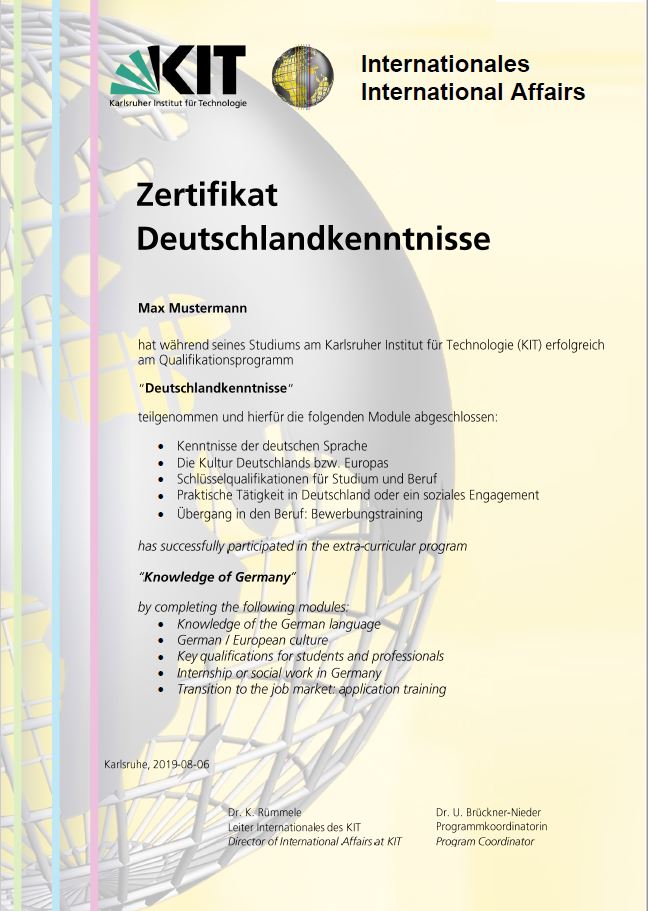Your ZDeK Certificate proves that you are interested in Germany, not only as far as studies, life, and work are concerned, but also in terms of culture and getting along with the Germans.
Knowledge about Germans and Germany is important to German companies doing both national and international business. It helps better represent your employer’s position. Moreover, it facilitates and deepens exchange with colleagues and other Germans.
At an international company, your employer will appreciate your knowledge of Germany, as it will facilitate contacts to German companies.
Which Qualifications Do Students Have to Acquire?
The Knowledge of Germany Certificate covers five modules.
To pass these modules, students have to successfully complete one course per module. The courses that may be attended are listed on the flyer. The credits obtained may be included in your total final grade.
Your Contact Person for Module 1:
Ksenija Fazlic-Walter
Adenauerring 2, building 50.20, room 312, 76131 Karlsruhe
Phone: +49 (0)721 608 44903
Email: ksenija.fazlic-walter∂kit.edu
Your Contact Persons for Module 2:
Forum
Dr. Christine Mielke
InformatiKOM, Adenauerring 12, 2.OG, 76131 Karlsruhe
Phone: +49 (0)721 608 46920 / 46919
Email: christine.mielke∂kit.edu
HoC:
Dr. Alexa Maria Kunz
Fritz-Erler-Str. 23, 76133 Karlsruhe
Tel.: +49 (0)721 608-45847
Email: alexa.kunz∂kit.edu
To pass the module, courses of at least two credits in total must be attended at the House of Competence (HoC) or the Forum (General Studies. Forum Science and Society):
Forum
A course in the area of “Schlüsselqualifikationen,” Studium Generale, Bereich "Kreativität und Kommunikation"
Your Contact Persons for Module 3:
HoC
Dr. Alexa Maria Kunz
Fritz-Erler-Str. 23, 76133 Karlsruhe
Tel.: +49 (0)721 608-45847
Email: alexa.kunz∂kit.edu
Forum
Dr. Christine Mielke
InformatiKOM, Adenauerring 12, 2.OG, 76131 Karlsruhe
Phone: +49 (0)721 608 46920
Email: christine.mielke∂kit.edu
This module serves to familiarize students with working life in Germany. Afterwards, students can provide proof of this experience. Students have a variety of opportunities, including work in associations or clubs. To obtain good insight, students have to work for at least six months. This has to be documented.
To obtain the ZDeK Certificate, the following activities are recognized:
Dr. Uta Brückner-Nieder
Campus South, Geb. 01.90, International Student Hub, Kaiserstr. 14, 76131 Karlsruhe
Email: uta.brueckner-nieder∂kit.edu
Module 5 supports your change from the university to the job. You will obtain knowledge on how to start a career, e.g. on the search for jobs, the application procedure, and the start of work. Choose one course of KIT career-service among various lectures, webinars and workshops:
These and other courses can be found at https://www.irm.kit.edu/english/Trainings.php.
Your Contact Person for Module 5:
Julia Neer
Vincenz-Prießnitz-Str. 1, building 07.07, 3rd floor, room 304, 76131 Karlsruhe
Phone: +49 (0)721 608 46988
Email: julia.neer∂kit.edu
When Is the Certificate Granted?
For Modules 1, 2, 3, and 5, you will need a signature on the flyer by the persons responsible for the courses you joined. As an alternative, you can send the transcript of records to the program coordinator.
For Module 4, present your report of experience or the certificates to the program coordinator of the International Students Office. When sending your proofs, please note that the duration and type of work must be obvious from the proof.
You will be granted the Knowledge of Germany Certificate by the International Students Office after you have presented or sent the completed flyer or other certificates to the program coordinator.
The Certificate will list all courses attended and passed. It is signed by the Head of the International Affairs Business Unit.
Contacts
Program Coordinator
Issue of the Certificate, contact person for general aspects and questions relating to Module 3:
International Affairs Business Unit
International Students Office (IStO)
Dr. Uta Brückner-Nieder
Campus South, Geb. 01.90, International Student Hub, Kaiserstr. 14, 76131 Karlsruhe
Email: uta.brueckner-nieder∂kit.edu
Module 1: Knowledge of the German Language
Studienkolleg (StK)/Language Center (SpZ)
Ksenija Fazlic-Walter
Campus South Adenauerring 2, 76131 Karlsruhe, building 50.20, room 312
Phone: +49 (0)721 608-44903
Email: ksenija.fazlic-walter∂kit.edu
Module 2: The Culture of Germany and Europe
Forum
Dr. Christine Mielke
Campus South InformatiKOM, Adenauerring 12, 2.OG, 76131 Karlsruhe
Phone: +49 (0)721 608 46920
Email: christine.mielke∂kit.edu
House of Competence (HoC)
Dr. Alexa Maria Kunz
Fritz-Erler-Str. 23, 76133 Karlsruhe
Phone: +49 (0)721 608-45847
Email: alexa.kunz∂kit.edu
Modul 3: Key Competencies for Studies and Work
House of Competence (HoC)
Dr. Alexa Maria Kunz
Fritz-Erler-Str. 23, 76133 Karlsruhe
Phone: +49 (0)721 608-45847
Email: alexa.kunz∂kit.edu
Forum
Dr. Christine Mielke
Campus South InformatiKOM, Adenauerring 12, 2.OG, 76131 Karlsruhe
Phone: +49 (0)721 608 46920 / 46919
Email: christine.mielke∂kit.edu
Module 4: Work in Germany or Social Work
International Affairs Business Unit
International Students Office (IStO)
Dr. Uta Brückner-Nieder
Campus South, Geb. 01.90, International Student Hub, Kaiserstr. 14, 76131 Karlsruhe
Email: uta.brueckner-nieder∂kit.edu
Buddy-Program:
International Affairs Business Unit
International Students Office (IStO)
Annette Seiter
Campus South, Geb. 01.90, International Student Hub, Kaiserstr. 14, 76131 Karlsruhe
Email: annette.seiter∂kit.edu
Module 5: Transition to the Job: Application Training
Career Service und Alumni (CSA)
Julia Neer
Vincenz-Prießnitz-Str. 1, building 07.07, 3rd floor, room 304, 76131 Karlsruhe
Phone: +49 (0)721 608 46988
Email: Julia.neer∂kit.edu

.jpg)
